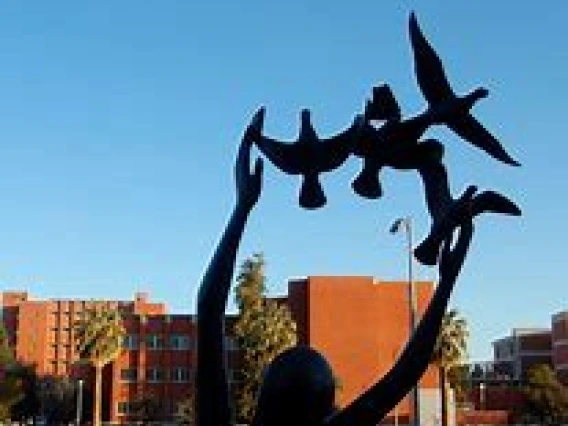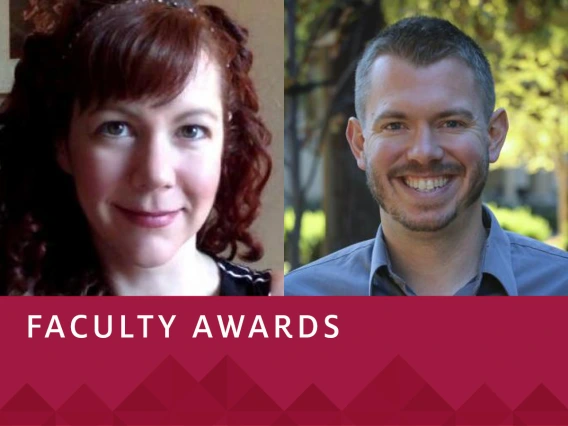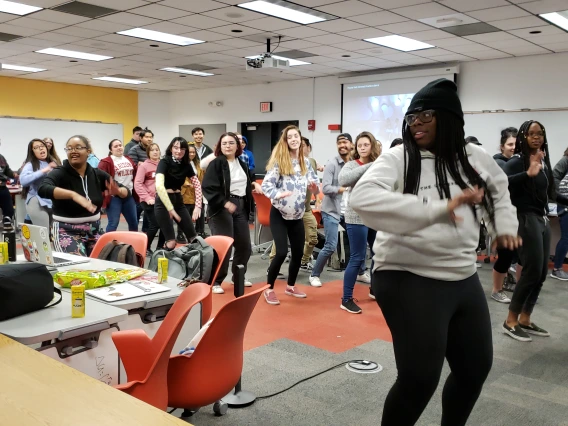CNN publishes opinion written by University of Arizona EAS Alumna



Experts from the Department of East Asian Studies will hold a series of virtual talks this fall centered on tensions between the United States and China and ongoing discrimination against Asian Americans within the U.S.
“Pandemic Blues & Blame Games: Anti-Asian Rhetoric & U.S.-China Antagonism,” featuring presentations from three professors will kick off the series on Oct. 14, with a virtual event starting at 4 p.m.
“We felt like all of a sudden, Asia and particularly China, was coming to the forefront of people’s minds, and not in a positive way. We thought we could use this situation and this interest as a teachable moment, to further the dialogue and engagement about China to a broader public,” says Albert Welter, department head.
The presentations are:
“There is no better moment than this year to bring a deeper conversation about Asia. What’s happening today, we can think about like a replay of the 19th century, but in the digital age,” Ren says. “All of the anti-Chinese racism, particularly compared to other groups, is about technology and the future, but a similar discourse happened in the 19th century.”
The next event will be a discussion about current events in Hong Kong, on Tuesday, Nov. 17, co-sponsored by the Departments of East Asian Studies and History and Pima Community College.


Introduction
1. “Different Viruses: Pandemic Politics in US and China”
Fabio Lanza, Professor of Modern Chinese History
This presentation explores the politics behind the pandemic, especially the politics of “blaming China” in the US (and, in part, of blaming the US in China). We will highlight not only the danger inherent in his viral tug-of-war, but also the hidden and deep global connections that this rhetoric obscures.
2. “Viral Peril: Persistent Fear of Asian Pacific Americans”
Brett Esaki, Professor of Asian Pacific American Studies
Fear of Asians and Pacific Islanders, found domestically and abroad, has been a persistent theme throughout Asian Pacific American history. This presentation will walk through significant moments in US history where the Yellow Peril linked together concerns about disease, morality, civilization, and economic security—and hence will shed light on our present reality.
3. “Don’t Chat: Impacts of WeChat’s Ban on American Citizens”
Hai Ren, Professor of Modern Chinese Culture
What is WeChat? How is WeChat used in China and in the United States? Why is the government trying to ban WeChat? How could the WeChat ban negatively affect millions of Americans, their families, and American companies, as well as the US-China relations?

Congratulations to the College of Humanities’ Outstanding Senior for Spring 2020, Grace Faerber!
Faerber is graduating with a double major in East Asian Studies, Chinese language emphasis, and Global Studies, with a pre-law minor. She has been awarded a Boren Fellowship to fund her upcoming master’s degree program at the Hopkins-Nanjing Center in China, where she will study International Studies with a concentration in International Politics.
During her time as an East Asian Studies major, Faerber studied abroad in China, completed internships at the U.S. Agency for International Development and U.S. Senate, and served as a College of Humanities Student Ambassador, where she appreciated the opportunity to share her passion for language and culture study with other students.
“As we enter the world of graduate study, full-time work, and whatever else our degree may bring, we cannot forget nor underestimate the incredible value of a Humanities degree,” she told fellow graduates in her virtual commencement speech. “The understanding of the human experience we gain as Humanities majors provides us with a unique appreciation for anything and everything we do.”
Andrés D. Oñate, instructor for the CHN 460 course, “U.S.-China Relations in the Modern World,” nominated Faerber for the Outstanding Senior award. A former diplomat himself, Oñate says she possesses the skills that are indispensable for a successful career in the Foreign Service.
“I can unequivocally say that she possesses the qualities needed to succeed in whatever endeavor she chooses, be it the State Department, another government office, or higher education. She is intellectually gifted, writes extremely well, is highly motivated, resourceful, organized, trustworthy, dependable, and, importantly, works well with others,” he wrote. “I easily see her ascending to heights one can only dream of at this time in one’s career.”
Faerber told her fellow graduates that “we’re each equipped with unique and valuable skills in communication, critical thinking and problem solving – the most important skill, however, as we enter this turbulent world full of unknowns, is the skill of adaptability.”
“We are explorers, filled with curiosity and wonder about the world around us, the world before us, and the world after us. During our time at the University of Arizona, we have spent hours upon hours marveling at other cultures, practicing other languages, discussing history, critiquing politics,” Faerber said. “I ask that each of you not abandon that sense of curiosity and wonder and instead bring that attitude to the post-graduate world that desperately needs it to discover new medical solutions, build bridges between governments, write the next New York Times Bestseller, and inspire younger generations.”

Maggie Camp and Robert Stephan have been selected as the College of Humanities 2020 faculty award winners.
Camp, Assistant Professor of East Asian Studies, is the Distinguished Undergraduate Advising/Mentoring Award recipient. Camp was also the Distinguished Teaching Award recipient in 2015.
Stephan, Assistant Professor in the Department of Religious Studies and Classics, is the Distinguished Teaching Award recipient. He received the Distinguished Undergraduate Advising/Mentoring Award recipient in 2019.
During the past decade, Camp has been dedicated to increasing East Asian Studies majors and minors, with significant results, said Jiang Wu, acting department head.
“She is truly exemplary in the field of student advising, with sophisticated thinking about student retention,” he said. “In addition, she has worked extensively with COH and UArizona advising teams to coordinate mentoring activities.”
Religious Studies and Classics Department Head Karen Seat said Stephan’s courses are “wildly popular” and he receives rave reviews from student evaluations.
“Dr. Stephan has the kind of presence in the classroom that can hold the attention of hundreds of students, and his presentation materials both in class and online are visually stunning,” Seat said. “In everything he does, he brings his uniquely positive enthusiasm, and students respond to this. He is a gifted and hardworking educator, and he has successfully sparked a love of the humanities for hundreds of students at the University of Arizona.”

Two professors in the East Asian Studies Department have been promoted, demonstrating excellent performance in teaching, service and research.
Wenhao Diao is promoted from Assistant Professor of East Asian Studies to tenured Associate Professor of East Asian Studies; and Takashi Miura is promoted from Assistant Professor of East Asian Studies to tenured Associate Professor of East Asian Studies.
Diao's research deals with the socio -linguistic and -cultural aspects of language learning and use and she has primarily focused on the phenomenon of study abroad. She is an affiliated faculty member in the interdisciplinary graduate program of Second Language Acquisition and Teaching.
Miura's research focuses on Japanese religions in the early modern and modern periods. He is the author of Agents of World Renewal: The Rise of Yonaoshi Gods in Japan, which examines the spread of the concept of "world renewal" (yonaoshi) in Japanese society from the late 18th to early 20th centuries

With grant funding from the Academy of Korean Studies, Sunyoung Yang is developing the University of Arizona’s Korean Studies program, focusing the curriculum on hands-on projects to attract and excite students.
Yang, an assistant professor hired as the first tenure-track faculty member of Korean studies in the Department of East Asian Studies, says the popularity of hallyu, or “Korean wave” is drawing students to learn more about Korean culture.
The learning-by-doing component involves class projects like learning K-pop dance, drawing web-toons, making short films, and broadcasting Korean cooking shows on YouTube in addition to reading and writing about Korean pop culture. The projects for her students are similar to ones that Yang had previously collaborated on during her time as a founding member of the Seoul Youth Factory for Alternative Culture, collaborating with engineers and artists on digital storytelling projects.
“I aim to help my students learn by engaging in actual projects like these,” Yang says. “I’ve seen firsthand how effective these projects can be to educate youth in their teens and early 20s. These opportunities will enable students to learn more in depth and critically.”
The combination of hallyu popularity and hands-on learning form the core of new classes, including general education offerings like “K-pop, Webtoons, Ethnic Food, and More: Understanding Korean Popular Culture,” “Introduction to Korea through Films,” and “Class, Gender, and Family in Korea.”
“These courses are in demand for students from diverse social and cultural backgrounds,” Yang says. “Hands-on, project-based Korean popular culture courses will continue to encourage students to develop their creativity required for the knowledge economy.”
The department will continue to develop Korean Studies, which is now offered to students as a minor in either the language or cultural emphasis, in equal standing with Chinese and Japanese studies to create a more comprehensive East Asian Studies program.
“I intend to advance Korean studies at UA as a flagship Korean studies program in the U.S. Southwest,” Yang says.
The curriculum developments complement Yang’s research as a cultural anthropologist, studying on the development of the Internet and various online communities and cultures in Korea and East Asia.
Yang examined the dynamic between online lives and offline struggles in her book “Loser” Aesthetics: Online User Communities and Cultural Politics in South Korea, documenting the influence of new media and information and communication technologies on society with a focus on youth, labor, and gender issues.
A new project, also supported by a grant from the Academy of Korean Studies, will involve more in-depth research on conflicting new gender politics activated in online communities. Issues like the secret and non-consensual use of spy cameras for the filming and photographing of women, the #MeToo movement, misogynistic violence, and protests and demonstrations against the criminalization of abortion are all major concerns online.
“There’s a new phase of social movements demanding gender equity and feminism enhanced by the Internet. These issues have brought about a nationwide awakening,” she says. “Through this research project, I intend to conduct further field research and expand in-depth interviews to include the voices of more diverse actors engaged in these new phenomena, which will provide more meaningful and rich data.”
Grace Faerber, graduating with a double major in East Asian Studies and Global Studies, has been awarded the prestigious Boren Fellowship to fund her graduate study in China.
Faerber, the College of Humanities Outstanding Senior recipient for Spring 2020, will attend the Johns Hopkins University – Nanjing University Center for Chinese and American Studies beginning in September.
The Boren Fellowship supports U.S. graduate students seeking overseas research and language study in world regions critical to U.S. national security interests. As a Boren Fellow, Faerber will receive $24,000 for her graduate program in China, a Master of Arts in International Studies with a concentration in International Politics dually-awarded by Johns Hopkins and Nanjing University. After graduating, as a Boren Award alumna, Faerber will be committed to a career in public service, working in U.S. federal government positions critical to national security.
Faerber has been practicing Mandarin Chinese for more than 10 years, beginning her studies as an International Baccalaureate student at Mesa Academy and Westwood High in Mesa, Arizona. She chose to attend the University of Arizona because of the Chinese language concentration offered through the East Asian Studies major. Additional courses on Chinese history and politics inspired her to add a second major of Global Studies, focusing on international relations.
“The interdisciplinary aspect of my education – studying language, humanities topics like East Asian religion and culture, as well as global politics and law – has provided me with a comprehensive, wholistic understanding of East Asia and international affairs,” she said. “My undergraduate education will provide a great foundation for me to build on throughout the rest of my academic career as I focus on U.S.-China Relations.”
Faerber studied abroad in Hangzhou, China the summer after her freshman year, calling it the most influential experience in her language studies.
“It provided me with my first opportunity to visit and live in the country I had been studying for so long and the ability to sharpen my language skills and understanding of Chinese culture,” she said. “This study abroad experience solidified my interest in a career related to China and my commitment to becoming fluent in Mandarin.”
The following summer, she studied international affairs at American University in Washington, D.C. while completing two internships, first at the office of U.S. Sen. Kyrsten Sinema, then at the U.S. Agency for International Development (USAID). During her time at the University of Arizona, Faerber was also a College of Humanities Student Ambassador and worked at the Campus Recreation Center.
“I am incredibly excited to advance my understanding of Mandarin, China, and U.S.-China relations at the distinguished Hopkins-Nanjing Center and will be always thankful for the University of Arizona and the College of Humanities for helping me get there,” she said.

Dear College of Humanities Students,
Despite the ever-changing challenges posed by the spread of coronavirus (COVID-19), the College of Humanities remains focused on two priorities for students: your health and your academic progress toward graduation.
We are making every effort to help you succeed in your academic lives and beyond. Our faculty and staff are working, in coordination with University officials, to minimize any interruptions. Starting Wednesday, March 18, classes will be conducted online. Our priority is to ensure your academic progress is not disrupted and that you will finish the semester and graduate on time—whether that’s this term or in a term to come.
Our incredible advising team is available to support you with all of its usual services, but now in a virtual format. Advising can take place via email, phone, or Zoom—whichever works best for you. Please remember to check Trellis Advise for appointments. The advisors will be in touch soon with more detailed information about how they will be providing support.
If you have had to return suddenly from a Study Abroad program and anticipate any difficulty completing your coursework and earning credit for the semester, please contact Lyn Durán (laduran@email.arizona.edu ) as soon as possible so that she can explore with you how we might be able to help.
Individual faculty members will communicate to their students any necessary information about transitioning to online classes, as well as any updates to their syllabi for the remainder of the semester. This will enable all students to complete their courses and have valuable learning experiences. Fortunately, the College of Humanities is a leader in online learning and many faculty members have pursued innovative ways of teaching to increase student engagement, so we are well-prepared to make this adjustment and will extend additional help to students whenever possible. I am in touch with the COH undergraduate ASUA Senator Grace Sluga and Graduate and Professional Council Representative Jonathan Henao-Muñoz, both of whom will be helpful in communicating important messages between students and College and University leadership.
Any official campus updates will be posted to the University’s Coronavirus Information page. Information related to more specific student concerns is available at the Dean of Students Office and Guidance for Research Students and Postdocs. For other on-campus resources, please see information about University Libraries Changes and Support, the Disability Resource Center, and Housing & Residential Life.
Please follow all prescribed health and safety precautions, including social distancing, to minimize the spread of this disease and keep our campus and community safe. Campus Health remains open should you feel the need to seek medical attention.
We will convey additional information to students as necessary, and we appreciate your patience and flexibility as the College and University move forward through this difficult time.
With best wishes,
Dean Alain-Philippe Durand
P.S. On Monday morning via Facebook, University Provost Liesl Folks and Dean of Students Kendal Washington White presented a live video update to address questions. You can see a recording of this session here.